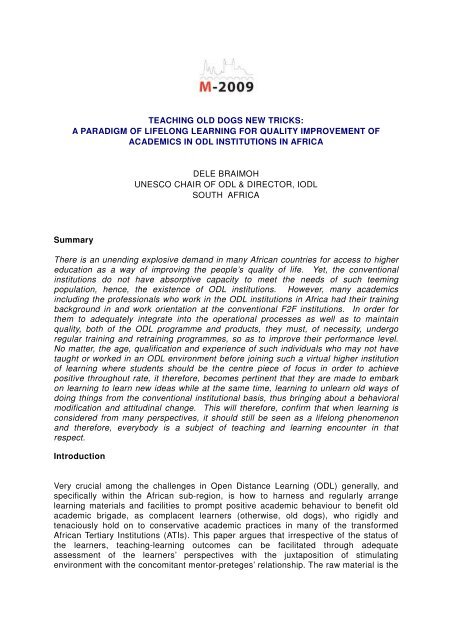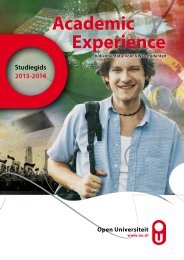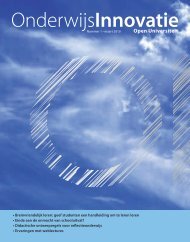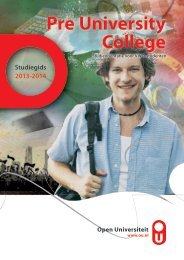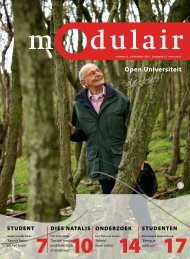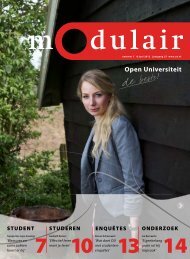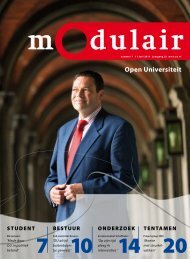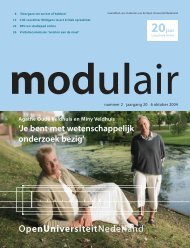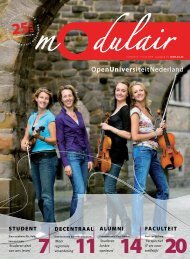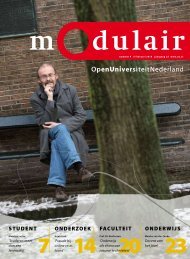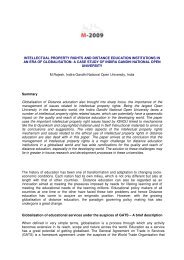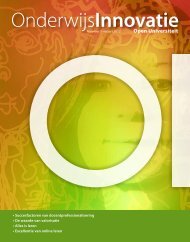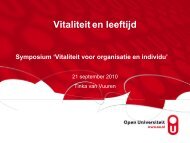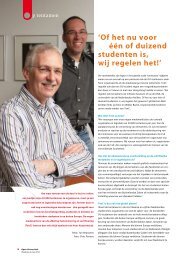TEACHING OLD DOGS NEW TRICKS: A PARADIGM OF LIFELONG ...
TEACHING OLD DOGS NEW TRICKS: A PARADIGM OF LIFELONG ...
TEACHING OLD DOGS NEW TRICKS: A PARADIGM OF LIFELONG ...
Create successful ePaper yourself
Turn your PDF publications into a flip-book with our unique Google optimized e-Paper software.
<strong>TEACHING</strong> <strong>OLD</strong> <strong>DOGS</strong> <strong>NEW</strong> <strong>TRICKS</strong>:<br />
A <strong>PARADIGM</strong> <strong>OF</strong> <strong>LIFELONG</strong> LEARNING FOR QUALITY IMPROVEMENT <strong>OF</strong><br />
ACADEMICS IN ODL INSTITUTIONS IN AFRICA<br />
DELE BRAIMOH<br />
UNESCO CHAIR <strong>OF</strong> ODL & DIRECTOR, IODL<br />
SOUTH AFRICA<br />
Summary<br />
There is an unending explosive demand in many African countries for access to higher<br />
education as a way of improving the people’s quality of life. Yet, the conventional<br />
institutions do not have absorptive capacity to meet the needs of such teeming<br />
population, hence, the existence of ODL institutions. However, many academics<br />
including the professionals who work in the ODL institutions in Africa had their training<br />
background in and work orientation at the conventional F2F institutions. In order for<br />
them to adequately integrate into the operational processes as well as to maintain<br />
quality, both of the ODL programme and products, they must, of necessity, undergo<br />
regular training and retraining programmes, so as to improve their performance level.<br />
No matter, the age, qualification and experience of such individuals who may not have<br />
taught or worked in an ODL environment before joining such a virtual higher institution<br />
of learning where students should be the centre piece of focus in order to achieve<br />
positive throughout rate, it therefore, becomes pertinent that they are made to embark<br />
on learning to learn new ideas while at the same time, learning to unlearn old ways of<br />
doing things from the conventional institutional basis, thus bringing about a behavioral<br />
modification and attitudinal change. This will therefore, confirm that when learning is<br />
considered from many perspectives, it should still be seen as a lifelong phenomenon<br />
and therefore, everybody is a subject of teaching and learning encounter in that<br />
respect.<br />
Introduction<br />
Very crucial among the challenges in Open Distance Learning (ODL) generally, and<br />
specifically within the African sub-region, is how to harness and regularly arrange<br />
learning materials and facilities to prompt positive academic behaviour to benefit old<br />
academic brigade, as complacent learners (otherwise, old dogs), who rigidly and<br />
tenaciously hold on to conservative academic practices in many of the transformed<br />
African Tertiary Institutions (ATIs). This paper argues that irrespective of the status of<br />
the learners, teaching-learning outcomes can be facilitated through adequate<br />
assessment of the learners’ perspectives with the juxtaposition of stimulating<br />
environment with the concomitant mentor-preteges’ relationship. The raw material is the
learner’s ability to boost expected learning outcome through adequate and personal<br />
belief in one’s capabilities and self-worth.<br />
Prefatory<br />
The spiral demand by the general public for placement in Higher Institutions of Learning<br />
(HIL) is a criterion with which to measure the incapability of many conventional<br />
institutions to effectively cope with the absorptive capacity of the teeming African<br />
population. This therefore, calls for a more viable and economic route to widen access<br />
of majority of people to higher education. The most plausible solution to this problem is<br />
the deliberate adoption of Open Distance Learning (ODL) because of its attractive<br />
virtues which according to Braimoh (1998) include the following:<br />
• It mitigates the perennial problem of restricted admission process<br />
• It encourages learning and earning to go pari-passu. This is because it is<br />
no longer rewarding for the employers of labour to grant study leave with<br />
pay to their employees as a result of the global economic recession.<br />
Consequently too, it is also no longer attractive to the employees to resign<br />
their jobs for the luxury of full time study in the face of deepening global<br />
unemployment situation.<br />
• It stimulates intellectual activity and skills development as a result of<br />
independent thinking arising from learners’ exposure to variety of learning<br />
materials both in print and electronic formats.<br />
• It is more cost effective when compared with the conventional higher<br />
education, particularly when it is considered from the premise of the<br />
enormity of expenditure that goes into the running conventional tertiary<br />
institutions to achieve the same goal of person-power development through<br />
the ODL route.<br />
• It has the element of immediacy, especially in the application of the skills<br />
and knowledge gained while studying for the purpose of improving the<br />
learner’s job performance at his/her work post.<br />
• It encourages massification of products as a result of the heterogeneity of<br />
clientele, subject coverage and geographical dispersion of learners’<br />
location.<br />
• It is not disruptive in any form, as distance learning does not require the<br />
learner to be completely removed from his/her community, workplace or<br />
family members.<br />
It must however be noted, that majority of single, bi-modal or mixed modal Distance<br />
Higher Education Institutions (DHEIs) in most African countries are staffed with<br />
academics drawn predominantly from the F2F traditional Institutions. Consequently,<br />
because of their initial academic training, practical orientation and work experience,<br />
which are at variance with ODL Institutions, adaptability to ODL practice therefore<br />
becomes a ”war” with concomitant effect on academic quality, weak reflexive research<br />
output and a frustrating throughput rate.<br />
This paper therefore, proposes the adoption of a strategic approach, to the<br />
improvement of academic quality of staff of African ODL institutions, especially, through
a deliberate lifelong professional training and development programme. This will not<br />
only create a continuous learning environment among academic staff members in terms<br />
of the theories, principles and practices of ODL, but it will also enhance their<br />
productivity in all its ramifications with a resultant positive change in the unholy<br />
metaphor of access without success.<br />
Background<br />
One common axiom especially in the teaching-learning environment, which focuses<br />
particularly on knowledge generation, creation, appreciation and or acquisition, is that<br />
“old dogs” cannot be taught. Several explanations are teased to often understand this<br />
standpoint, but, without any equivocation, in teaching-learning environment, there is<br />
an in-built mechanism for the assessment of personal efforts in learning outcome. For<br />
instance, the teacher and or programme facilitator (PF) is able, to consistently and<br />
periodically evaluate, through his/her daily instructional contribution, the generation of<br />
knowledge and meaningful ideas that would be germane to changing learners’<br />
behaviour. Learners’ behaviour depict the assumed consequent effect of learning input<br />
which can either be, ‘excellent academic performance (otherwise behaviour)’, ‘good<br />
academic performance’, ‘average academic performance’, ‘poor academic<br />
performance’, and or ‘academic failure’ when evaluated. There are different categories<br />
of learners as studies have shown. For instance, there are learners who either<br />
develop their capacity to maximize learning opportunities early or those whose<br />
capacities are merely prompted much later in life. Others operate within the set-up of<br />
multi-complex learning styles and which some studies have attested to (Jackson,<br />
Hobman, Jimmieson & Martin, 2008; Osiki, 2008; Siadaty & Taghiyareh, 2007). If the<br />
learner’s capacity to appreciate new information is at a loss and or blocked due to<br />
certain intervening variables such as illnesses and or emotional trauma, there are<br />
known psychological methods that could be harnessed to invigorate learning process.<br />
Using the difficult terrain that may block the learnt information, and subsequently affect<br />
information retrieval, Osiki (2008) stresses that old learners are unambiguously<br />
prompted to maximize learning opportunities through the application of relaxation<br />
techniques and reframing methods which are subsumed through psychotherapeutic<br />
facilitation. Osiki (2008), Osiki & Braimoh, (2008) opine that employing the<br />
manipulation of learners’ emotionality along the application of selected<br />
psychotherapies, could positively boost teaching outcomes involving distance learners<br />
(DLs). According to the gleaned outcome details from the ‘Centre for Positive Practices’<br />
(2008), the stimulation of effective learning outcome could be explained through the<br />
implication of multi-factors among which are: self-concept, self-esteem, self-confidence,<br />
anxiety, background, socio-economic status, gender and self-efficacy according to .<br />
Self-efficacy according to Pajares & Miller, (1994), is shown to hold greater explanatory<br />
and predictive power for academic outcomes than many other determinants.<br />
Learning Process<br />
Learning is an abstract, invisible, unending and permanent phenomenon. Everyone,<br />
no matter the age, academic qualification, social level, marital status or gender<br />
difference, is bound to learn, although the pace of learning and the ability to<br />
comprehend the learnt information may however, differ from person to person. The<br />
reality is that any meaningful learning is expected to lead to behavioural change in the<br />
recipient. In other words, according to Braimoh (2008), human beings must engage in<br />
learning process in order to learn new ideas and gain valuable knowledge while at the
same time, learning to unlearn old and unprofitable habits, which may not only be<br />
injurious to the learner him/herself alone, but also detrimental to the developmental<br />
growth of the society in which he/she lives.<br />
Learning can be undertaken consciously or unconsciously, it can be planned or<br />
accidental, it can be acquired formally, informally or non-formally. It is difficult as<br />
much as it is unacceptable for anyone to consider himself/herself a completely<br />
knowledgeable person, thus requiring no further training in any form, to update his<br />
knowledge base, especially in this global technologically changing times, where<br />
yesteryears’ experiences are basically obsolete for solving today’s problems.<br />
Therefore, in order to meet up with the global changing world, we must aspire to<br />
become a learning society, which according to Omolewa (2008), starts from cradle but<br />
transcends the grave.<br />
To corroborate the idea of learning as cutting across all levels of people and<br />
throughout one’s lifespan, Oduaran (2002) opines that it will be culturally, socially,<br />
economically, politically and psychologically illogical, unfair and wasteful to confine<br />
learning to any one segment of life, society, location (space) and time. He goes<br />
further to advice that every resource in society [that is] capable of widening access to<br />
learning must profitably be utilized, so as to promote the goal of learning to live and<br />
living to learn, particularly for the betterment of humankind in the 21st century.<br />
One can compartmentalize learning into many boxes, as earlier shown above,<br />
however, within this premise, we would confine ourselves to the organized formal and<br />
non-formal learning processes which are consciously engaged in by individuals for the<br />
purpose of professional development. Going by this platform, it therefore, challenges<br />
individual to be able to make meaningful contributions to the society in which he/she<br />
lives as well as for the skills improvement of the “learner” for a better and quality job<br />
performance.<br />
Prompting Adequate Learning Outcome through Personal Belief<br />
Learners learn through several methods as there are unique differences both in<br />
people (DLs), learning environments/challenges, programme facilitators (PFs)<br />
(instructors or teachers), and or the materials to be learnt. Although the differentiallearning<br />
methods have been emphasized by several studies. Dunn and Dunn (1978)<br />
argued that learners are affected by their:<br />
1. Immediate environment (sound, light, temperature, and design);<br />
2. Own emotionality (motivation, persistence, responsibility, and need for<br />
structure or flexibility);<br />
3. Sociological needs (self, pair, peers, team, adult, or varied); and<br />
4. Physical needs (perceptual strengths, intake, time, and mobility),<br />
fundamental however is the learner’s ability in assessing his/her personal<br />
worth.<br />
When a learner believes in his or her capabilities to successfully perform a designed<br />
task and the PFs adequately stimulate a conducive learning environment, learning<br />
and learning outcomes are at apogee. Though Osiki (2008) research outcome has
demonstrated how learning materials could be arranged and facilitated to obtain<br />
expected results, nonetheless, the provision of environmental conditions such as<br />
involving instructional strategies and appropriate technology that improve the<br />
strategies and self-efficacy of the learner is an additional plus. When the belief that a<br />
learner has about his or her capabilities is positive, and he/she recognizes that PFs’<br />
appreciate his/her assessment of personal worth, it boosts his psychology, while at the<br />
same time, sustaining adequate mental frame of mind which is a condition that is<br />
expected for learning to become meaningful. Learning of tasks becomes meaningful<br />
when the recipients are able to apply the benefits of the learning outcome to induce<br />
behavioural changes. Learners are thus subsequently enabled, both to maximize the<br />
benefits of learning and to demonstrate the experience for successful learning that is<br />
arguably transformatory.<br />
Re-echoing the relevance of personal belief in ones capabilities, the ‘Centre for<br />
Positive Practices’ subsumed the notion within the model of triadic reciprocality.<br />
According to the concept of the triadic reciprocality, the ability to influence various<br />
personal determinants is accorded to five basic human capabilities which are<br />
a) Symbolizing,<br />
b) Forethought,<br />
c) Vicarious,<br />
d) Self-regulatory, and<br />
e) Self-reflective.<br />
Furthermore, the idea that learners are generally gifted with the capability of<br />
symbolizing is not in doubt. In any academic context (i.e. the ODL and or DHEIs) and<br />
especially within the African sub-regions, such symbolization allows learners to<br />
process abstract experiences into models that guide their learning and performance.<br />
In the elaboration of this, when learners (otherwise, academics of some standing),<br />
who have assumed the circumstances of an epitomized ‘academic indolence’ are to<br />
be goaded to a responsible academic and professional behaviour, an academic<br />
mentor could, for instance, facilitate learning through guided imitation until expected<br />
academic behaviour is modified. The case of the old dogs (otherwise, learners) being<br />
taught active research culture can be enabled through a well stimulated and valuedriven<br />
collaborative studies which of course, also has the propensity for the<br />
sustainability of further mentor-protégés relationship.<br />
In another dimension, learners’ personal capabilities and the appreciation of self-worth<br />
is further propelled through the manipulative effects of forethought. Forethought<br />
according to the ‘American Heritage Dictionary’ (2003), involves the deliberation,<br />
consideration, and planning before hand, which constitute part of cognitive<br />
representation of future events. Learning effectiveness has a direct link between what<br />
would be learnt and future outcome and it has a very prominent index in the practical<br />
application of the benefits of the reframing psychotherapeutic technique. Watching a<br />
self-efficacious model perform a mathematical calculation using a particular strategy<br />
may lead the observer to foresee this within the scope of his or her own capabilities<br />
which may consequently lead him/her to perform with precision of success.<br />
Buttressing the beneficial outcome of forethought, Bandura (1986) said that if we had<br />
to directly experience everything we learn, we would not have adequate time and
opportunity to learn very much; and hence, when a learner observes a model’s<br />
thinking through text-based soliloquy, the observer would be directed on how to<br />
conceptualize the object of the observation in order to overcome self-doubts about<br />
successful performance. In emphasizing self-efficacy and how this relates to learner’s<br />
perception of their capabilities, Bandura (1986) defined self-efficacy as "people's<br />
judgements of their capabilities to organize and execute courses of action required to<br />
attain designated types of performance”. Self-efficacy refers to people's beliefs about<br />
their capability to perform certain actions in a specific domain (Bandura, 1993). Locke<br />
& Latham (1990) stated that self-efficacy is a significant determinant of achievement,<br />
operating independently of the individuals' underlying skills in a specific context<br />
(Schunk, 1984). Bandura (1993) stated that individuals with high self-efficacy<br />
"heighten and sustain their efforts in the face of failure".<br />
In Miltiadou’s (2009) submission, learners articulate and maximize learning<br />
opportunities through the advantaged use of self-regulation. According to Miltiadou,<br />
self-regulatory learning, though an important motivation devise, occurs from “students'<br />
behaviours that are systematically oriented toward attainment of learning goals"<br />
(Schunk,1984). Self-regulated learners not only need to posses cognition (knowledge to<br />
build upon), and metacognition (the knowledge and monitoring of learning strategies),<br />
but they must also be motivated to use their metacognitive strategies to build upon their<br />
understandings of instructional material (Pintrich & De Groot, 1990).<br />
Self-regulation has been studied in traditional classrooms in order to provide an<br />
understanding of how students use their cognition, metacognition, and motivation in<br />
order to experience successful learning. Cognitive and metacognitive strategies provide<br />
the building blocks for constructing knowledge within a learning environment.<br />
Motivation, especially within the distance education context, provides the fuel for<br />
student engagement. Without motivation, students will not think about nor organize<br />
their knowledge simply because of being separated from the instructor by time and<br />
place (Miltiadou, 2009). Research conducted by Blocher (1997) has shown that selfregulated<br />
students have a strong desire to learn and are goal directed.<br />
Empowering Learners through a Direct Instructional Teaching on Learning How<br />
to Learn<br />
Fundamental to learning and its outcome, is the appreciation of the notion that learning,<br />
especially new things may not be any easy task. To stimulate learning, irrespective of<br />
the multi-factors of age, gender, socio-economics as well as previous and related<br />
experiences of the learners, learning tasks should be arranged to facilitate acquisition,<br />
remembering and easy recall. The ODL experience, without any doubt, continues to<br />
indicate that lecturers need regular up-dating to remain articulate and academically<br />
relevant. The beginning of the twenty-first century exemplifies that all stake holders,<br />
particularly within the structure of ODL cannot afford to exhibit academic indolence.<br />
Maintaining high academic and professional competence and or standards, PFs along<br />
with both supporting staff and learners must be goaded to adequately respond to<br />
learning challenges and competences.<br />
According to the ‘Report of Learning Working Group’ (2009), it states that, ‘learning to<br />
learn may be a straightforward idea: to understand it, we need no help from<br />
psychological theory, in reality, both defining the concept and finding ways of enhancing<br />
the skill (s) involved are much more tricky’. Furthermore, the idea of learning to learn<br />
has a confused and confusing relationship with terms that are commonly used in
education, such as problem solving or thinking skills or critical thinking among others<br />
which invariably has the capacity to enhance both learning and learning to learn. The<br />
assertion was therefore, concluded when it said that learning to learn is not a single<br />
entity or skill, but a family of learning practices that enhance one’s capacity to learn.<br />
The Royal Society of Arts (2009) summed this up when it said that a family of learning<br />
competences are, among others:<br />
• understanding how to learn, taking account of one’s preferred learning styles and<br />
understanding the need to, and how to manage one’s own learning throughout<br />
life.<br />
• learning, systematically, to think.<br />
• exploring and reaching an understanding of one’s own creative talents, and to<br />
make best use of them.<br />
• learning to enjoy and love learning for its own sake and as part of understanding<br />
oneself.<br />
• achieving high standards in literacy, numeracy and spatial understanding.<br />
• achieving high standards of competence in handling information and<br />
communication technology and understanding the underlying processes.<br />
In his argument for how best to arrange learning materials as well as prompting a<br />
background of learning expectations that could be instrumental to adequate and<br />
sustainable behavioural outcomes, Watkins (2007) said that learning to learn consists<br />
of several different family members which include:<br />
• making learning an object of attention;<br />
• making learning an object of conversation;<br />
• making learning an object of reflection; and<br />
• making learning an object of learning itself.<br />
In a more precise way, and that which places premium on the importance of psychology<br />
and or the teaching-learning activities that are sustainable through psychotherapeutic<br />
knowledge generation and creation, significant dimension on how the complacent<br />
academics and DLs can be prompted to learn and learning meaningfully are provided.<br />
For instance, in any such environment, adequate use of graded re-inforcers are<br />
administered, and learners are able to appreciate through value-directed teachinglearning<br />
instructions, while they learn how to continue to learn and learning with end<br />
results. When learners are prompted to learn with such a goal-directed task, learners<br />
are put on the alert and that, the outcome of learning should be made to benefit<br />
mankind. Learning essentially should produce meaningful behavioural changes with the<br />
intention of advancing and promoting the collective interest of mankind, in socioeconomics,<br />
politics, mental health and general wellness.<br />
According to the ‘Report of Learning Workshop Group’ (2009), while supporting the<br />
notion for the relevance of psychological package for inducing learners generally,<br />
argued when it said that the ‘core of learning to learn is meta-cognition’. In a further<br />
analogy, it said that though there is learning, there is also learning about learning.<br />
Individuals for instance, think and or emote, but they can also think about their thinking<br />
rather than being complacent and indolent. Thus in consequence, by implying metacognition<br />
as far as prompted learning is concerned, it encapsulates and defines the<br />
individual capacity to monitor, evaluate, control and change how he/she thinks and<br />
learns. In a less formal terms, learning to learn means reflecting on one’s learning and<br />
intentionally applying the results of one’s reflection to further learning, the report
submits. In brief, learning to learn (otherwise, prompting old dogs to learn how to learn)<br />
involves:<br />
• understanding the demands that a learning task makes;<br />
• knowing about intellectual processes and how they work;<br />
• generating and considering strategies to cope with the task;<br />
• getting better at choosing the strategies that are the most appropriate for the<br />
task; and<br />
• monitoring and evaluating the subsequent learning behaviour through feedback<br />
on the extent to which the chosen strategies have led to success with the task.<br />
Boosting Academic Commitments through Delayed Utterances<br />
Prominent in academic behaviour is that learners learn differentially even under similar<br />
conditions. But the dimension on how socio-environmental situation impact on the<br />
learners’ ability to acquire and use generated and created information is a constant<br />
research focus. Under the circumstance therefore, teaching-learning environment<br />
should be so arranged that learners of multiple background would have the<br />
opportunities to be assisted to learn. While emotion is involved in the learners’ abilities<br />
to articulate learning materials to a beneficial level, the PFs should delay their<br />
unbecoming utterances in order to facilitate adequate and expected learning. Many of<br />
today’s DLs may be completely nonplussed due to negative and derogatory statements<br />
either from their peers or their academic mentors.<br />
In the contribution to the sustainability of learning effectiveness and in particular,<br />
facilitating how human emotions can be directed in the achievement of meaningful<br />
academic results (i.e. research behaviour), Dunn & Dunn (1978) said that learners are<br />
affected by their:<br />
i. Immediate environment;<br />
ii.<br />
iii.<br />
iv.<br />
Own emotionality;<br />
Sociological needs; and<br />
Physical needs. Other studies implicating the beneficial effect of learners’<br />
emotionality and how it could be harnessed in boosting academic behaviour<br />
include that of Osiki (2008).<br />
The learner’s emotional status is a combination of four indices which include:<br />
i. Presence of environmental stimulus;<br />
ii.<br />
iii.<br />
iv.<br />
Sense of heightened physiological arousal;<br />
Personal idiosyncrasies; and<br />
Cognitive appraisal of any given situation.<br />
For the professional teacher to acquire information germane to their individual<br />
development, the state of their mental stability and happiness should be congenial as<br />
Osiki, (2008) posits. Learners academic/professional behaviour and, in particular,
esearch empowerment gets goaded when their self-perception and how they are<br />
perceived by others correlate positively.<br />
Conclusion<br />
Learners’ adequate perception of their self-worth and or capabilities is significant in<br />
how they learn and continue to learn. In stimulating adequate academic and<br />
professional behaviour, as the case may be in ODL, programme facilitators (PFs)<br />
should be enthusiastic enough to assess and articulate the perspective of the learners.<br />
When the learners perceive that his or her academic mentor identifies with his/her<br />
learning difficulties or challenges, the psychology of their mental frame gets boosted,<br />
and subsequently, the learners are more ready to learn. Adequate teaching-learning<br />
relationship could therefore, be more facilitated when and if learner-teacher interaction<br />
is built on the principle of psychotherapeutic relationship. In such environment both the<br />
learners and PFs get into the relationship with the intention of symbiotically influencing<br />
the other.<br />
We must say, in conclusion however, and without any iota of doubt or fear of<br />
intimidation, that many of the people who work in distance education institutions as<br />
academics and professionals, came into ODL by default and not by deliberate training.<br />
For this simple reason therefore, a process of initiation is expedient for all of us, so as<br />
to be able to understand the operational imperatives of such institutions vis-à-vis the<br />
staff expectations in contributing to the progress of such institutions. ODL cannot and<br />
should not be considered as a subject but it must be taken holistically as a professional<br />
field of practice, just like Law, Journalism and Medicine, because of its human and<br />
national developmental orientation. Therefore, our objective suggestion will be that<br />
those academics and professional staff members who do not have any form of prior<br />
ODL training and are currently working in predominantly virtual educational institution<br />
across the globe, must undergo a compulsory part-time one year distance learning<br />
training, leading to the award of a diploma certificate in ODL. This is to enable them<br />
understand the underpinning principles and practice including the scope and<br />
requirements of ODL activities including research and student handling processes in an<br />
ODL Institution. We must however, not be rigid to embrace change as life itself is not<br />
static but dynamic, therefore, in any process of transformation, we must be ready to<br />
learn new things while we must also be prepared to consciously unlearn our old ways<br />
of doing things. This proposal is not a new thing as some conventional universities in<br />
some parts of Africa have already embraced the practice of initiating their new<br />
academic staff into the teaching fraternity at the university level. This is especially for<br />
those who do not have any qualification in education-based discipline even if such<br />
individuals already possess the doctorate degrees in other disciplines.<br />
References<br />
• American Heritage Dictionary of the English Language, Fourth Edition copyright<br />
2003. New York; Houghton.<br />
• Bandura, A. (1986). Social Foundations of Thought and Action: A Social<br />
Cognitive Theory. Englewood Cliffs, NJ: Prentice-Hall
• Bandura, A. (1993). Perceived self-efficacy in cognitive functioning. Educational<br />
Psychologist, 28(2), 117-148.<br />
• Blocher, M. (1997). Self-regulation of cognitive strategies and motivation to<br />
enhance interaction and social presence in computer mediated communication.<br />
In Miltiadou, M. (2009). Motivational constructs as predictors of success in the<br />
online classroom Accessed 18 March 2009 from http://<br />
seamonkey.ed.asu.edu/~mcisaac/emc703/mariosf.html<br />
• Braimoh, D (2008) “Lifelong Learning through mentoring process and its<br />
operational dimensions in society” Turkish Online Journal of Distance Education,<br />
vol. 9, Nº2.<br />
• Braimoh, D. (1998) “Distance Education Programme: A precursor to National<br />
Manpower Development in Lesotho”, Indian Journal of Open learning, 7(2) pp.<br />
155 – 169.<br />
• Braimoh, D. (2008) “Teaching and cheating in ODL Institutions: The<br />
interventionist role of research in professional development”. A keynote address<br />
delivered at the official launch of the professional and Administrative Research<br />
Group (PARG), UNISA, Senate, 14th March, 2008.<br />
• Oduaran, A.B (2002) “Learning to Live and Living to Learn in the 21st century,”<br />
Inaugural Lecture, University of Botswana.<br />
• Centre for Positive Practices: Interventions enhancing Self-Efficacy, 2008.<br />
Accessed January 17 2009<br />
from:http://www.positivepractices.com/efficacy/interventionsenhancingsel.htmlind<br />
ex:efficacy<br />
• Dunn, R, & Dunn, K (1978). Teaching students through their individual learning<br />
styles: A practical approach. Reston, VA: Reston Publishing Company.<br />
• Jackson, C. J., Hobman, E., Jimmieson, N., and Martin. R. (2008). Comparing<br />
Different Approach and Avoidance Models of Learning and Personality in the<br />
Prediction of Work, University and Leadership Outcomes. British Journal of<br />
Psychology, 1-30.<br />
• Locke, E. A., & Latham, G. P. (1990). A theory of goal setting and task<br />
performance. Englewood Cliffs, NJ: Prentice Hall<br />
• Miltiadou, M. (2009). Motivational constructs as predictors of success in the<br />
online<br />
classroom<br />
Accessed 18 March 2009 from<br />
http://seamonkey.ed.asu.edu/~mcisaac/emc703/mariosf.html<br />
• Omolewa, M, (2008) Keynote Address, 2nd ACDE Conference, Lagos, Nigeria.<br />
• Osiki, J. O. (2008). Reducing the Perceived Impact of Mass Academic Failure on<br />
Significant People through Multi-Behaviour Techniques (MBTS). International<br />
Journal of Emotional Psychology and Sport Ethics, Vol. 10; 132-155.
• Osiki, J. O. & Braimoh, Dele. (2008). “Management of Learning Behaviour in<br />
Higher Education: The Outcome of Cooperative and Collaborative Approaches”,<br />
National University of Lesotho, Southern Africa. Submitted to JASCE, Japan.<br />
• Pajares, F., & Miller, M. D. (1994). Role of self-efficacy and self-concept beliefs<br />
in mathematical problem solving: A path analysis. Journal of Educational<br />
Psychology, Vol. 86 (2), 193-203.<br />
• Pintrich, P. R., & De Groot, E. V. (1990). Motivational and Self-Regulated<br />
Learning Components of Classroom Academic Performance. Journal of<br />
Educational Psychology, 82(1), 33-40.<br />
• Report of Learning Working Group: About Learning, 2009. Accessed 17 March<br />
2009 from www.demos.org<br />
• Schunk, D. H. (1984). Sequential attributional feedback and children's<br />
achievement behaviours. Journal of Educational Psychology, 76(6), 1159-1169.<br />
• Siadaty, M. & Taghiyareh, F. (2007). PALS2: “Pedagogically Adaptive Learning<br />
System based on Learning Styles” Seventh IEEE International Conference on<br />
Advanced Learning Technologies (ICALT 2007)<br />
• The Royal Society of Arts, 2009. Accessed 18 March 2009 from<br />
http://www.answers.com/topic/<br />
• royal-society<br />
• Watkins, C. (2007). Effective Learning in the Classroom. New York; Sage<br />
Publications.


